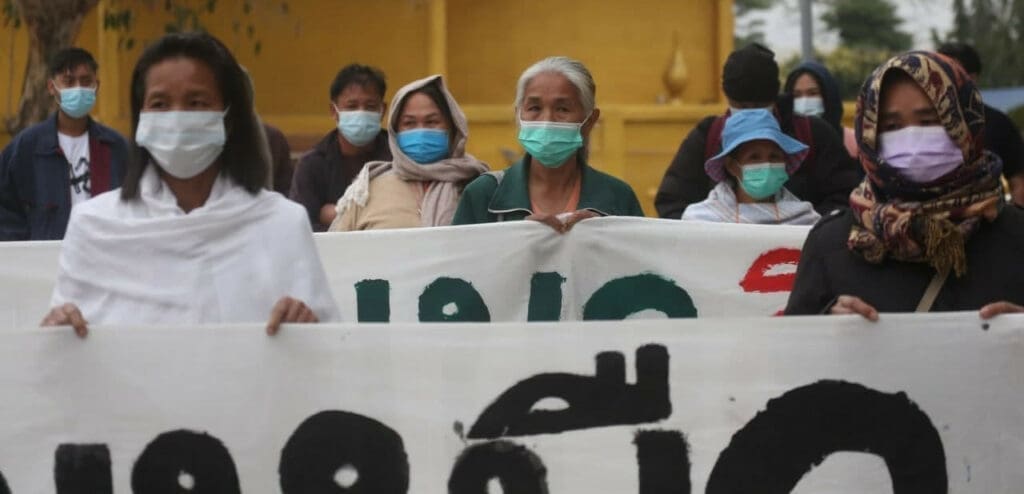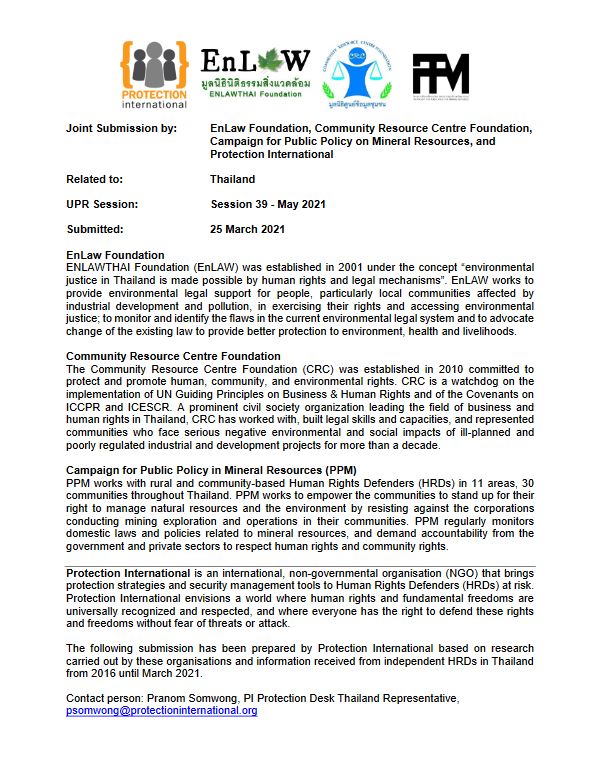On 25 March 2021, Protection International, together with ENLAWTHAI Foundation (EnLAW), Community Resource Centre Foundation (CRC), and Campaign for Public Policy in Mineral Resources (PPM) submitted a contribution to Thailand’s Universal Periodic Review (UPR).
The Universal Periodic Review (UPR) is a human rights mechanism through which, the Human Rights Council (HRC) reviews, on a periodic basis, the fulfilment by each of the United Nations’ 192 Member States of their human rights obligations and commitments. NGOs, national human rights institutions, human rights defenders, academic institutions and research institutes, regional organisations, as well as civil society representatives may submit additional, credible and reliable information to the universal periodic review at certain relevant steps of the process, which are summarised by the Office of the High Commissioner for Human Rights in a Summary of Stakeholders’ information.
This joint UPR submission highlights the government of Thailand’s efforts to intimidate, harass, and repress human rights defenders (HRDs) under the period in review, with particular attention paid to the government’s COVID-19 response. This submission is based upon research carried out by Protection International, EnLAW, CRC, and PPM, including testimonies collected from Thai HRDs from 2016 up until March 2021.
Since 2014, the government of Thailand, under the leadership of Prime Minister General Prayuth Chan-o-cha, has used judicial harassment, violence, and threats of violence to repress and intimidate HRDs who publicly oppose government policies or private companies’ activities in their communities. Rural, Indigenous, and women human rights defenders (WHRDs) face the greatest risks and are often among the poorest and most harassed in Thai society. In calling for justice and ethnic and Indigenous rights, they are harassed, threatened, and criminalized, and their lives and liberties are perpetually exposed to risks by state and non-state actors.
By rigorously outlining these various incidents, the UPR submission also provides evidence of the judicial harassment and criminalization HRDs are forced to endure in Thailand, the physical threats and violence perpetrated against environmental and land rights defenders, as well as the various types of threats and intimidation used against Indigenous HRDs. For example, the country’s standing forest conservation policies have already alienated and criminalized many forest dwellers, including Indigenous Peoples. In 2014, the Thai military government established The ‘Forest Reclamation Policies and the ‘Conservation Master Plan’, policies that actively discriminate against the poor who face land confiscation, eviction, and imprisonment. It also reviews the various institutional protection mechanisms present in Thailand for HRDs and assesses the current situation in the country since the previous UPR Cycle in 2016.
The COVID-19 pandemic and government response have further exposed the systemic injustices affecting human rights and the environment, and those who protect both. The Thai government has enacted an Emergency Decree with the stated aim of controlling COVID-19, though it affords them power to act with impunity further restrict public participation, and criminalize dissent. All those who defend human rights are affected, though the COVID-19 pandemic and response disproportionately affect women human rights defenders (WHRDs) in particular. For WHRDs, the COVID pandemic has compounded the existing structural barriers and exploitations they face as women and mothers, including poverty, rape, domestic violence, and climate change.
Frustrated with the government’s poor response to the COVID-19 pandemic and economic hardship, HRDs are calling for a commitment to human rights, political change, and respect for minority and Indigenous rights. In response, the government tightened its grip on power and used repressive laws, such as the Public Assembly Bill, Sedition Law, Lèse-majesté Law, and Computer Crimes Act, to repress dissidents.
Most importantly, the contributing organisations address recommendations to the government of Thailand on a wide range of topics, including the State’s duties to: protect women, HRDs and those at risk; guarantee access to justice for women human rights defenders; ensure comprehensive public participation in development projects; recommendations specific to indigenous people; and ensuring civil and politic rights for pro-democracy youth HRDs.
Download Thailand’s UPR submission bellow



 UPR submission
UPR submission